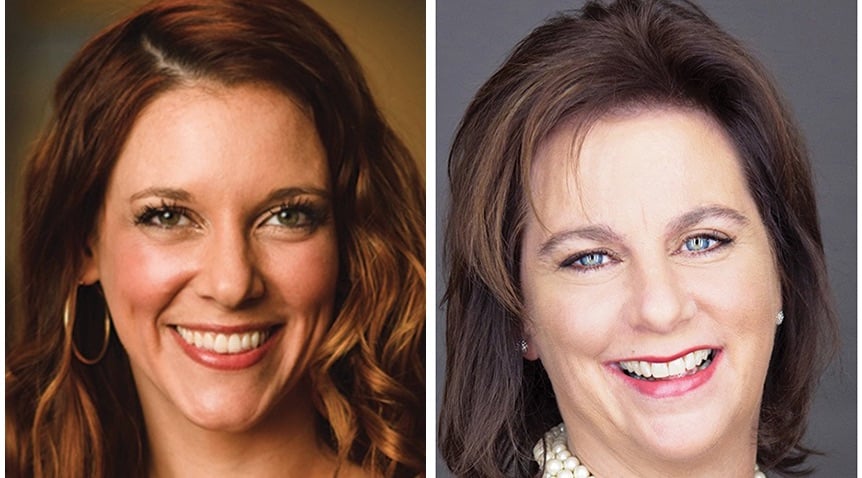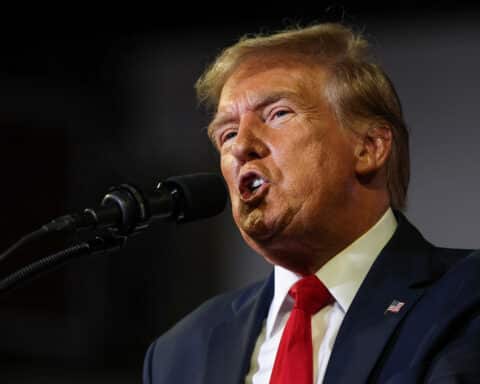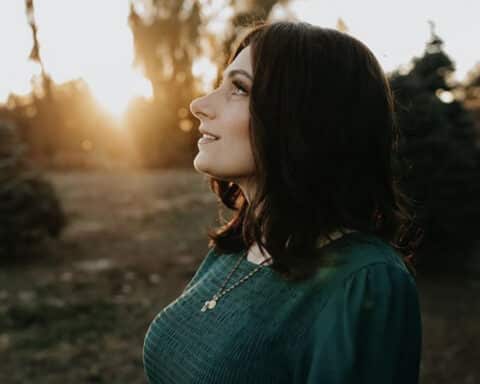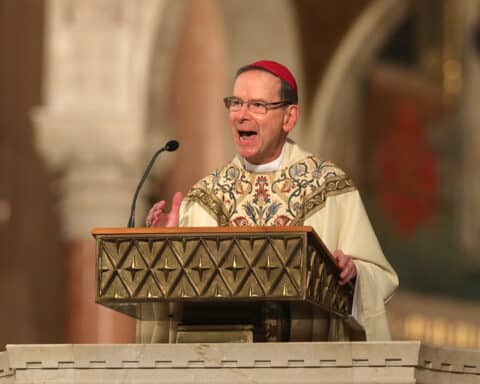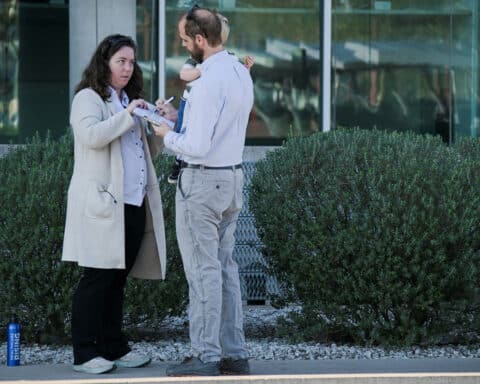Their stories are not unique: Two women who started out as pro-choice but have changed their minds. Now, Catherine Glenn Foster, president and CEO of Americans United for Life, and Marjorie Dannenfelser, president of the Susan B. Anthony List, are working on a national level to change the politics of the pro-life movement. Here are their stories.
Being pro-life in a ‘fallen world’
Catherine Glenn Foster said that she didn’t know much about being pro-life — or about abortion — when she was a 19-year-old sophomore in college and pregnant. That made her vulnerable to pro-choice information on the internet.
But once she got into the abortion clinic, she recalled years later, “I got the strongest sense that what I was doing was deeply wrong.”
She started questioning the staff when she was being prepped for the procedure, but she said four women held her down and tried to keep her quiet, and in five minutes it was over. She has never forgotten the sound of the suction machine and the physical and spiritual pain.
“This week,” she told Our Sunday Visitor in December, “that child would have been 18 years old.”
| Related Reading |
|---|
|
True empowerment: 2020 March for Life theme returns to pro-life beliefs of early feminism |
Nearly two decades later, Foster is president and CEO of Americans United For Life, a leading pro-life legal team whose strategists have been involved in every pro-life case before the U.S. Supreme Court since Roe v. Wade. She personally has been involved in numerous precedent-setting litigations and constitutional questions on abortion, maternal health and other pro-life issues.
Foster earned her law degree at Georgetown University Law Center, where she connected with a pro-life group on campus. She had a lot to learn, she admitted, and they inspired her.
“It was the clearest calling that I ever had in my life,” she said. “It was clear to me that my role was to help other women, other girls, with what I went through. I needed to be there to stand in the gap so that they would not be in the situation that I was in, and to stand there and represent and defend the precious, innocent and vulnerable children in the womb who have no say in the matter, who couldn’t be more defenseless. Someone needs to stand up for them.”
Foster is candid about her own crisis pregnancies: first the abortion, then her first living child, a daughter, was conceived out of wedlock. It was initially unclear if her second child was conceived as a result of rape (he was not), and her third child, a daughter, was prenatally misdiagnosed with a high probability of Trisomy 18, a chromosomal condition that often ends in abortion. She has walked the walk in choosing life.
She notes the encouraging political victories in recent years: a 25% increase in pro-life state laws; conscience protection is standing its ground; more pro-life judges have been confirmed; and the Trump administration has supported pro-life iniatives.
“And it took years to get the gruesome barbaric partial-birth abortion banned,” she said.
There’s still a long way to go. The United States is one of four countries lax in protecting the unborn, Foster noted. Canada has no national laws on abortion, and the other two are China and North Korea.
“We are not in good human rights company with them,” she said.
Science, Foster says, is helping to save lives.
“We’re seeing better ultrasounds than ever before,” she said. “Kids are seeing siblings and cousins, that this is a child in the womb. And we have a younger generation that’s committed to authenticity and transparency.”
Foster’s Catholic faith energizes work that can be exhausting and heartbreaking, and she often finds herself calling on God and praying for the bloodshed to end.
“We are a fallen world,” she said. “We need Jesus. I see so much hope for the defense of life, for these children. I know that what we are doing is right.”
Finding hope in the political landscape
Marjorie Dannenfelser was pro-choice until she met Catholic classmates at Duke University who knew and lived their faith.
“I started to listen to the other side,” she said. “When it came down to it, it was very difficult for me when I could not answer the question about the object of an abortion. What is that thing that was extracted? Was it someone of equal standing? I could not answer that with authenticity and maintain that pro-choice position.”
Science, faith and philosophy changed her mind about being pro-choice and led to a conversion to Catholicism. She also felt called to political activism in the pro-life arena.
“What became clear to me early on is that we needed to have women speaking out for the authentic interest of women,” she said. “We also needed a stronger political arm for the pro-life movement if we were ever going to make any strikes in law and in the court in terms of protecting them.”
Dannenfelser, a mother of five, worked with several pro-life organizations before becoming in 1993 one of the original organizers and now president of the Susan B. Anthony List based in Washington, D.C. She’s currently gearing up to serve as the Pro-Life Coalition leader in President Donald J. Trump’s 2020 campaign, a position that she held during his 2016 successful bid for election.
The Susan B. Anthony List endorses and supports pro-life candidates. The nationwide network of more than 700,000 Americans annually contributes millions of dollars to fund campaigns and outreaches to make voters aware of where lawmakers stand on protecting the unborn. They advocate for life through direct lobbying and grassroots campaigns.
“One of the best pieces of good news is the rising pro-life generation, the people in their 20s and 30s,” Dannenfelser said. “They have lived around the sciences of life, and they are more pro-life than any group.”
The goals of the Susan B. Anthony List goals are to have a Supreme Court that could potentially overturn Roe v. Wade and restore to the states the power to pass pro-life laws.
“The decision-making power on an issue of such deep moral consequences was taken out of the hands of the people,” she said.
“The work we are doing is vitally important for the future. Abortion is an evil that makes you want to recoil and go away, but it’s just the moment we need to engage. Our work will be felt by generations and generations to come.”
Maryann Gogniat Eidemiller writes from Pennsylvania.

